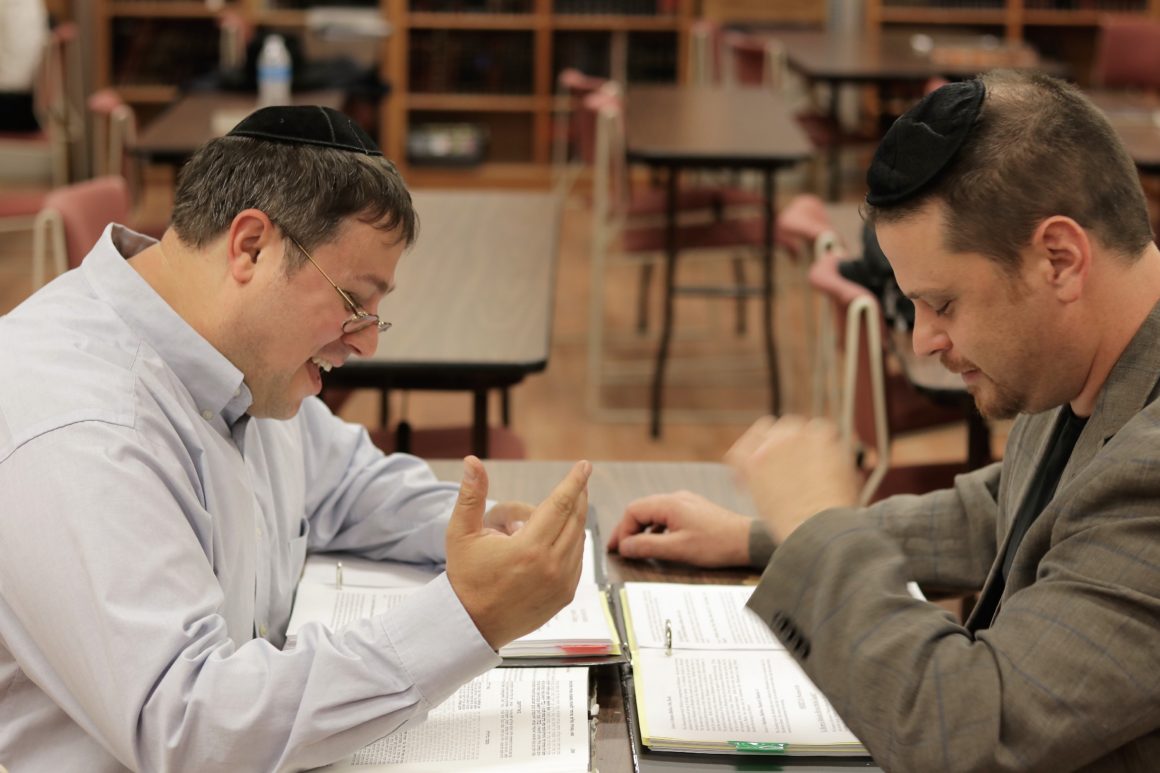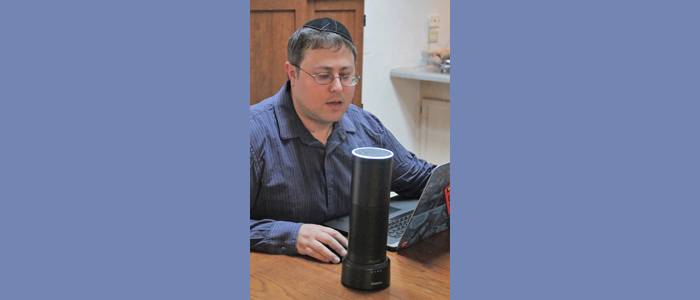It’s apparent that Mark Einhorn is one of those people who doesn’t require much sleep. He is a husband, father of four, vice president of information risk management, rabbi, gabbai at Ohr HaTorah synagogue, paper cut artist and magician. So when he saw the Alexa Skills Challenge: Kids contest, naturally he just had to create a skill to submit. A “skill” on the Alexa device is synonymous with an “app” for a mobile device.
The name of the skill that he submitted is called Lemonade Stand. Lemonade Stand is based on a 1970s computer game of the same name that Mark played as a child. It simulates operating a lemonade stand. The player tells the Alexa how many cups they want to sell, how many signs to use for advertising, and then set what your price will be for a cup of lemonade. It also gives the weather forecast, teaching kids about probability along with business skills. The player then makes or loses money depending on the weather, the choices they’ve made, and behind-the-scenes random supply/demand simulation factors.
“The Alexa platform was launched about three years ago, and I was one of the first 1,000 skills that were created for it,” says Mark. Now about 30,000 skills are available. “I created a couple of games initially, and then I set it aside for a little bit. Then I happened to see this competition, and I thought I know I can create something really great for this.”
Mark won “Best Educational Skill” for Lemonade Stand – one of five bonus prizes ($7,500) awarded. There were thousands of developers who registered and submitted ideas.
“Amazon is so eager for this voice-first to take off and be the leader they are pumping in millions of dollars on contests,” says Mark. “Every time people use my game, when it reaches a certain threshold, they send you a paycheck.”
For the next phase, Mark will be making a couple of improvements. “With these skills, they are somewhere in the cloud. As long as I keep that infrastructure up and running, the game will be available indefinitely,” says Mark. “Aside from (paying for) Amazon, the skill is free. Go to the Amazon app, look for Lemonade Stand and open it.”
Mark has developed apps for other companies but believes that Amazon has the best platform. “They are giving developers money and what they need – better than Google, Microsoft or Siri,” he says. “If you look at Microsoft, you think of software and the Xbox; when you look at Google, you think of a search engine. With Amazon, they are the largest offering of server infrastructure on the planet – more than everyone else combined. They not just selling stuff anymore, they are involved in dozens of these micro-businesses.”
Amazon has announced its next contest, Life Hacks Challenge, and Mark has already had his idea approved to enter the competition. A “life hack” is anything that makes everyday tasks faster, easier and more delightful.
His idea for this contest came from a common inconvenience. If you want to connect to Wi-Fi when you are at a restaurant or coffee shop, you typically need to go to the counter and ask for the network ID and password.
With Mark’s ‘WiFi Code’ you could go to an Alexa device at the business and say, “Alexa, open Wi-Fi code,” and then Alexa plays a special tone, and your phone recognizes the tone and it automatically connects you. “The tone has the network ID and password encoded in it,” says Mark. “You just need an application on your phone to make it work.” It works similar to a QR code; only it’s for sound.
He will find out if he has won this contest in July. In the meantime, he continues to find other ways to challenge himself.

Mark and his chavrusa (study partner), Dr. Henry Brown, working on smicha (rabbinical ordination) in the laws of Shabbos.
He is currently working on his second rabbinic ordination. For his first ordination, “I was with a group of 10 people, and we studied over two years. The final exam was open book, but it took about 20 hours to complete. It was a very rigorous, long process but very fulfilling.”
Mark feels that it is essential for his children to see him do these types of things. “It’s good for your kids to see their parent accomplishing things, doing things that are more than just being a parent – and more than just your job,” he says.
His entrepreneur spirit is rubbing off on his youngest son Shimon, who is 12 years old.
At the Passover table, the family was talking about starting a YouTube channel. While they were sharing ideas, Shimon came up with the idea of a channel on fist bumping. A fist bump gesture is similar in meaning to a handshake or high five.
“He did this little dance with this shtick where he called it a random fist bump,” says Mark. The next thing you know, Mark and Shimon were at the Scottsdale Quarter shopping complex making their first video.
“I told Shimon, here are our rules, we are going up to people first, and we are asking them if they want to be on the video – no sabotaging people,” says Mark. “It’s something fun for us to do and it’s controlled. It’s a learning opportunity. I’m learning about photography and social media marketing, and it’s building confidence in Shimon.”
Their goal is to get 1,000 random fist bumps. Mark designed a logo and had T-shirts and hats made for when they go out. “I said to Shimon we don’t do things just half here – when we go, we go all in.” To see the videos, visit facebook.com/pg/RandomFistBump/videos/.
To sign up for Lemonade Stand, visit amazon.com/Mark-Einhorn-Lemonade-Stand/. To see Mark’s business page, visit bitzki.com.






